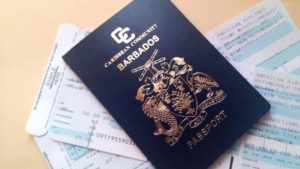 Barbados has the most powerful passport in the region and the 25th most powerful on the planet, according to the results of the latest world travel rankings.
Barbados has the most powerful passport in the region and the 25th most powerful on the planet, according to the results of the latest world travel rankings.
Barbados’ position in the Henley & Partners Visa Restrictions Index closely mirrors its performance on Passportindex.org’s rankings released earlier this year.
The rankings are based on the number of visa-free regions and countries to which a passport has access.
Barbados’ passport is immediately followed by Mexico and The Bahamas in 26th and 27th place respectively. Antigua & Barbuda and St Kitts & Nevis tied in 30th place.
Trinidad & Tobago and Venezuela landed the 32nd and 34th spots, slightly ahead of St Lucia and St Vincent & the Grenadines (tied 36th) and Grenada and Honduras in the 37th and 38th slots. Dominica rounded off the Caribbean top 40.
Further down the list were Belize, Guyana, Jamaica and Suriname, taking the 56th, 59th, 62nd and 65th places.
Cuba, Dominican Republic and Haiti brought up the rear with rankings of 76th, 80th and 86th of the countries surveyed.
Germany still has the most powerful passport in the world despite losing visa-free admission to one country. Sweden also remains static in second place, and Denmark, Finland, Italy, Spain and the US jointly rank third.
The UK, however, has slipped down yet another position this year to fourth, having shared first place with Germany for three consecutive years from 2013–2015.
Syria, Pakistan, Iraq and Afghanistan sit at the very bottom of the Henley & Partners Visa Restrictions Index, showing a slight change from last year’s ranking, with Somalia rising out of the bottom four.
In total, 48 countries lost ground over the past year, dropping between one and three ranks, and only 42 countries showed no movement at all.
Dr Christian H. Kälin, Chairman of Henley & Partners, says that the changing geopolitical climate could well affect the rankings over the next 12 months.
“We have witnessed several major events recently that are likely to have an impact on global mobility – including Brexit and the election of US President Donald Trump. Both can be interpreted as steps toward restricting movement and creating barriers to entry.
“This trend towards curbing travel freedom is already apparent in the shift in rankings on this year’s Visa Restrictions Index,” explained Kälin, a leading authority on international immigration and citizenship law and policy.
“There is still huge disparity in the levels of travel freedom between countries, despite the world becoming seemingly more mobile and interdependent. Generally, visa requirements are a reflection of a country’s relationship with others, and take into account diplomatic relationships between countries, reciprocal visa arrangements, security risks, and the dangers of visa and immigration regulation violations,” he added.
